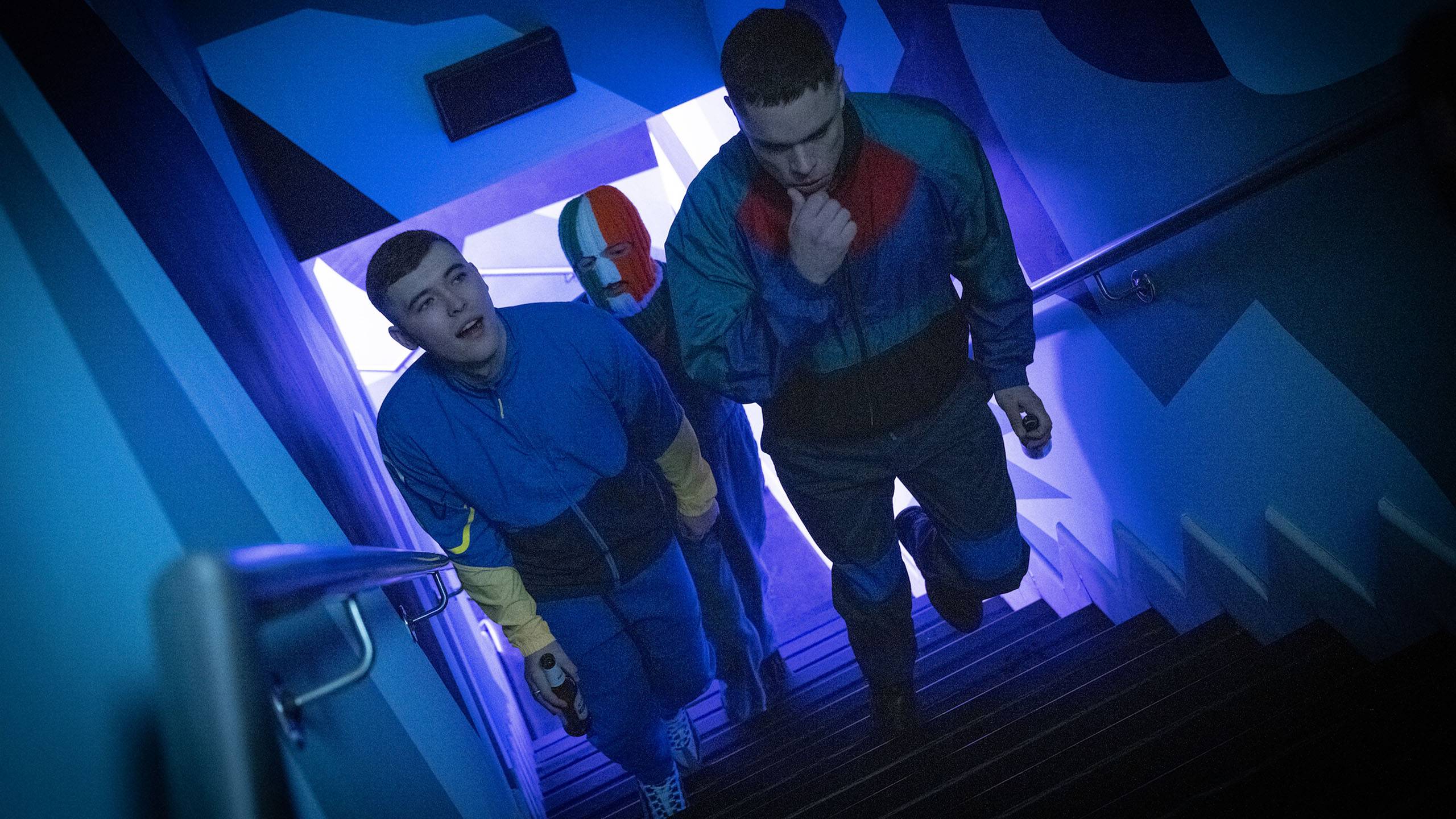Kneecap Sundance Film Review
*Kneecap has been sold to Sony Classic Pictures less than 12 hours after the premiere*

Kneecap is the latest film from Rich Peppiatt, whose debut feature, One Rogue Reporter, was nominated for Best Independent Feature at the 2014 National Film Awards, ultimately being acquired by Netflix.
The creation of his latest project has very serendipitous origins. In 2019, Peppiatt went to a concert in Belfast to see what was then an emerging hip-hop group called “Kneecap.” They rapped almost entirely in Irish, a language Peppiatt knew none of at the time. Still, he sensed something special about this group and spent the next several months attempting (unsuccessfully) to grab drinks with the trio. Eventually, his persistence paid off, resulting in drinks with the group leading well into the morning. In my conversation with Peppiatt before the premiere, he noted that the initial pint “turned into about twelve,” and by the team, he stumbled out of their house at “7 o-clock the next morning, [their] fate was sealed – we were en route to Sundance”. Sometimes, you have to will something into existence, and that’s precisely what they’ve done, already sealing a deal with Sony Classic Pictures less than 12 hours after the premiere.
Kneecap follows a hyperbolized version of the hip-hop trio consisting of Mo Chara (Liam Óg Ó hAnnaidh), Móglaí Bap (Naoise Ó Cairealláin), and DJ Provaí (JJ Ó Dochartaigh). The film makes no attempts to hide the Irish language; it is the largest Irish-language film ever produced. The “boys” of Kneecap are portrayed as rebels, drug enjoyers, and, quite frankly, agents of chaos, both in the film and real life. As I caught up with them before the premiere, I asked what they wanted the audience to leave the theatre thinking. Móglaí Bap quickly entered a plug for their website, Mo Chara added that he hoped folks bought enough to fund their skiing while in Park City, and DJ Próvaí finished by suggesting that the audience should leave thinking that “hedonistic behaviour is encouraged”. Certainly on-brand answers for a group that does not make any attempt to conform.
Still, they remain acutely aware of their group’s impact on the Irish language. Instead of language revitalization being something left to the old and the academic, Kneecap shows how Irish can be translated and amplified in the modern context of West Belfast. While you may not think it when you see him in his Irish balaclava, DJ Próvaí (JJ Ó Dochartaigh) actually worked as a teacher when the hip-hop group began and was passionate about revitalizing the Irish language with his pupils, following in the footsteps of his father, who was arrested during the 1972 Bloody Sunday uprising. Unfortunately, Ó Dochartaigh’s two worlds could only last for so long. He was eventually fired from his teaching positions after months of underage students turning up at his shows yelling “Sir,” and the board realizing that the man who had pulled down his pants on stage to reveal the words “Brits” and “Out” across his buttocks was a current teacher in their system.
Peppiatt acknowledged the importance of the Irish language to this group, even though they themselves rarely delve into the seriousness of their work. Since meeting the group, he has completed his first qualification in Irish, which he felt he had to do “out of respect for the band and out of respect for the Irish language”. The fact that Peppiatt was able to direct this film so clearly and confidently without being fluent in the language is a testament to his ability as a director but also to the universality of Kneecap as a symbol of both unity and rebellion.
The film itself explores all that makes the group who they are in a way that is as raw and real as possible. There is no “toning down” to create a more digestible narrative for the masses. There is rampant drug use, violence, and sex – all of which Kneecap has been rapping about for years. Despite this (or perhaps because of this), the audience still sees real heart amongst the members and has little choice but to empathize with their struggles. Móglaí Bap’s father in the film, played by the legendary Michael Fassbender is a radical republican who faked his death in order to further the movement, and the film directly illustrates the impact this fight for freedom has on the family unit. We see Mo Chara’s character beaten in a prison cell after refusing to speak English to the “peelers”, while also drawing comparisons to the role hip-hop played for African Americans in their rise against their oppressors. Lastly, we see DJ Próvaí’s relationship dissolve as he is forced to choose between the buttoned-up lifestyle of a teacher or the “hedonistic” path he ultimately desires.
Throughout Kneecap, we are kept enthralled by the characters’ uniqueness and the irresistible beat of their music, which comprises most of the film’s soundtrack. We watch the group rise from recording in DJ Próvaí’s tiny garage “studio” to rapping in Irish on stage in front of a sold-out crowd, and there is seldom a moment that isn’t providing some form of entertainment.
All of this being said, the film is neither perfect nor needs to be. Some characters, including those played by Simone Kirby and Josie Walker, feel somewhat underdeveloped. The acting inexperience of the Kneecap members shines through at times (although it is still quite an impressive turnaround from their first acting classes). The editing occasionally makes the picture feel more like a music video than a feature film. At the end of the day, what Kneecap does is entertain, educate, and make you feel – and this is best done through a project like this that embraces its rawness and its grittiness.
Underneath all of the layers of action, chaos, and rebellion, there is a story of loss and of belonging. The film ends by acknowledging that language is our lifeblood; it makes us who we are, and yet, every day, Indigenous languages are facing the threat of extinction. Who would have thought that the unlikely heroes here to save one of these languages are three lads from West Belfast in the North of Ireland? But it’s true.
They’re here to stay.
Stay tuned for a full video review on YouTube and an interview with the group and Rich Peppiatt here
More Sundance coverage here





Pingback: KNEECAP: Sundance Film Review (Video) - Points of Review
Pingback: Interview with KNEECAP at Sundance - Points of Review